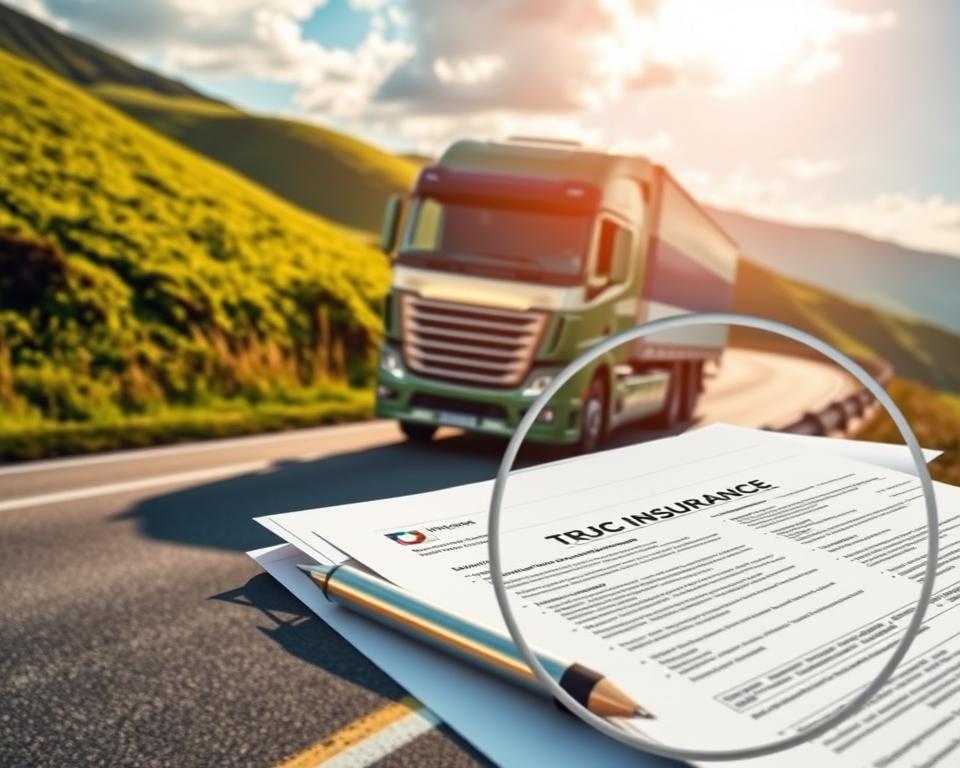For trucking companies and owner-operators, the right commercial truck insurance is key. It protects your vehicle and keeps your business safe from risks and financial losses.
Running a trucking business has its challenges. Accidents and cargo damage are common. The right truck insurance helps manage these risks. It ensures your business keeps moving forward.
Key Takeaways
- Understanding the importance of truck insurance for your business.
- Knowing the types of coverage available for commercial trucks.
- Learning how to choose the right insurance policy for your needs.
- Discovering ways to lower your insurance premiums.
- Recognizing the role of insurance in protecting your business assets.
Understanding Truck Insurance Fundamentals
Truck insurance can seem complex, but knowing the basics is key for any trucking business. It’s not just a legal must; it’s a way to safeguard your business from many risks.
What Makes Truck Insurance Different
Truck insurance is unlike regular auto insurance because of the special risks in commercial trucking. These risks include higher liability, the need for cargo insurance, and the chance of big losses from accidents or theft.
Legal Requirements for Commercial Trucks
Commercial trucks must follow strict insurance rules. The Federal Motor Carrier Safety Administration (FMCSA) requires a minimum of $750,000 in liability coverage. This amount can change based on the cargo and other factors.
The Cost of Being Uninsured
Driving without insurance can lead to big fines and the loss of your operating license. Also, you’ll have to pay personally for any damages or losses from an accident. This can be very costly.
- Fines and penalties for non-compliance
- Potential for license suspension
- Personal liability for damages
Knowing these basics is vital to keep your trucking business safe and in line with the law.
Types of Truck Insurance Policies
It’s key to know the different truck insurance policies to protect your business and assets. Trucking companies face many risks on the road. The right insurance can greatly help their financial health.
Primary Liability Coverage
Primary liability coverage is a must-have for truck insurance. It covers damages to others and property in an accident. This coverage is often needed by law and helps protect your business from expensive lawsuits.
Physical Damage Protection
Physical damage protection keeps your truck safe from accidents, theft, or other damage. It helps you fix or replace your vehicle. This way, you can avoid long downtime and big financial losses.
Cargo Insurance Options
Cargo insurance guards the goods you transport against loss or damage. It’s very important for trucking companies that carry valuable or sensitive cargo.
Non-Trucking Liability Insurance
Non-trucking liability insurance covers your truck when used for personal things, like errands. It helps protect your personal assets if there’s an accident.
In summary, there are many truck insurance policies out there. Each one is made to handle different risks and needs. Knowing these options helps trucking companies make smart insurance choices. This way, they can better protect their business.
Essential Coverage Options for Truck Owners
It’s key for truck owners to know about the main coverage options. Truck insurance is complex, with many policies to protect your business. Each policy is made for different needs.
Bobtail Insurance
Bobtail insurance covers your truck when it’s driving without a trailer. It’s great for owner-operators who drive without a load. This insurance helps protect them from liability.
Motor Truck Cargo Coverage
Motor truck cargo coverage protects the goods you carry. It’s vital for businesses that move valuable or sensitive items. This coverage helps cover losses or damages to the cargo.
| Coverage Type | Description | Benefit |
|---|---|---|
| Bobtail Insurance | Covers truck when not hauling a trailer | Protects against liability when operating without a load |
| Motor Truck Cargo Coverage | Protects goods being transported | Financial protection against cargo loss or damage |
| Trailer Interchange Coverage | Covers trailers borrowed or rented from other companies | Protects against damage to non-owned trailers |
| Uninsured/Underinsured Motorist Protection | Covers damages caused by uninsured or underinsured drivers | Ensures you’re not left with uncovered expenses due to another’s negligence |
Trailer Interchange Coverage
This coverage is key for trucking companies that swap trailers with others. It guards against damage to trailers not owned by your company.
Uninsured/Underinsured Motorist Protection
Uninsured/underinsured motorist protection is vital when another driver causes an accident but has little insurance. This coverage helps avoid big, uncovered costs.
Knowing and using these key coverage options helps truck owners get full protection. This way, they can handle the risks of trucking safely.
Top Truck Insurance Providers in the United States
In the United States, top truck insurance providers offer many policies for truck owners and businesses. It’s important to look at what each company offers. This helps find the best fit for your needs.
Progressive Commercial
Overview
Progressive Commercial is a well-known name in commercial truck insurance. They have a wide range of coverage options. This makes them a good choice for many trucking businesses, big or small.
- Flexible Coverage Options: Progressive lets you customize policies to fit your business needs.
- Competitive Pricing: They offer good rates and discounts to help lower your costs.
Cons
- Complex Claims Process: Some say the claims process can be hard and slow.
Features
- 24/7 Claims Service: Progressive is ready to help with claims anytime.
- Risk Management Tools: They have tools to help you manage risks better.
Recommendations
Progressive Commercial is great for businesses wanting flexible coverage and good prices. But, be ready for a possibly complicated claims process.
State Farm Commercial Vehicle Insurance
Overview
State Farm is a trusted name in commercial vehicle insurance for trucks. They offer many coverage options and have a big network of agents.
Pros
- Personalized Service: State Farm is known for its personal service and advice from agents.
- Comprehensive Coverage: They have wide coverage options to protect your business from risks.
Cons
- Higher Premiums: State Farm’s prices might be higher than some other providers.
Features
- 24/7 Claims Reporting: State Farm makes it easy to report claims anytime.
- Discounts: They offer discounts for safe driving and more.
Recommendations
State Farm Commercial Vehicle Insurance is good for businesses wanting personal service and wide coverage. But, be aware that their prices might be higher.
The Hartford Commercial Truck Insurance
Overview
The Hartford is a well-established name in commercial truck insurance. They offer many coverage options for different trucking businesses.
Pros
- Customizable Policies: The Hartford lets you tailor policies to your business needs.
- Excellent Customer Service: They are known for their great customer service and support.
Cons
- Limited Online Quotes: The Hartford might not offer online quotes for all businesses.
Features
- Risk Management Resources: The Hartford provides tools to help manage risks.
- Claims Service: They have a dedicated team for handling claims efficiently.
Recommendations
The Hartford Commercial Truck Insurance is good for businesses wanting custom policies and great service. But, be aware that not all businesses can get online quotes.
Factors Affecting Your Truck Insurance Premiums
Truck insurance premiums are not random. They are based on several factors that can change your business’s costs. Knowing these factors is key to controlling your insurance expenses.
Driving History and Experience
Your driving history and experience greatly affect your truck insurance rates. A clean record with no accidents or tickets can lower your premiums. But, accidents or tickets can raise them. Insurance companies see safe, experienced drivers as less risky.
Type and Age of Truck
The type and age of your truck also matter. Newer trucks or those with safety features might get lower rates. Older trucks or those without advanced safety might cost more due to accident risks or repair costs.
Cargo Type and Value
The cargo you carry and its value can also change your rates. High-value or dangerous cargo needs more expensive insurance. For example, electronics or perishable goods might need different insurance than dry bulk goods.
Operating Radius and Location
Where and how far you drive also affects your rates. Trucks driving long distances or in busy, risky areas might pay more. This is because they face more risks.
| Factor | Impact on Premiums | Potential Mitigation |
|---|---|---|
| Driving History | A clean record lowers premiums | Maintain a safe driving record |
| Type and Age of Truck | Newer trucks may have lower premiums | Invest in newer trucks or safety features |
| Cargo Type and Value | High-value cargo increases premiums | Optimize cargo insurance based on cargo type |
| Operating Radius and Location | Longer distances or high-risk areas increase premiums | Plan routes efficiently and avoid high-risk areas |
Understanding these factors can help you manage your truck insurance costs. You can keep your driving record clean, invest in newer trucks, or plan better routes. These steps can help lower your insurance costs.
How to Choose the Right Truck Insurance Policy
Finding the right truck insurance policy is key to protecting your business. There are many options out there. It’s important to pick one that fits your business needs.
Assessing Your Specific Business Needs
Start by assessing your business operations. Think about what kind of cargo you carry, the value of your trucks, and where you operate.
Comparing Quotes and Coverage Options
Comparing insurance quotes from different companies is a good idea. This way, you can find the best deal for your needs. Make sure the policies you compare are similar.

Reading the Fine Print
Always read the fine print of any policy before you sign. Know what’s covered, what’s not, and any conditions that might affect your coverage.
Working with Specialized Agents
Working with specialized insurance agents who know the trucking industry is helpful. They can offer valuable advice and help you understand truck insurance better.
By following these steps, you can choose a truck insurance policy that really protects your business. As
“Insurance is a critical component of a trucking company’s risk management strategy.”
, making a smart choice is essential for your business’s financial safety.
Money-Saving Tips for Truck Insurance
Trucking companies can save money on insurance without losing coverage. By using smart strategies, they can cut down on costs.
Bundle Multiple Policies
One easy way to save is by bundling policies with the same provider. Many insurers give discounts for buying more than one policy.
Implement Safety Programs
Starting safety programs can lower accident risks and premiums. These include driver training, vehicle checks, and monitoring driver habits.
| Strategy | Potential Savings | Implementation Difficulty |
|---|---|---|
| Bundle Multiple Policies | Up to 15% | Low |
| Implement Safety Programs | Up to 20% | Medium |
| Raise Deductibles Strategically | Up to 10% | Medium |
| Take Advantage of Discounts | Up to 5% | Low |
Raise Deductibles Strategically
Raising deductibles can lower premiums. But, make sure you can afford the deductible if you need to make a claim.
Take Advantage of Discounts
Many insurers offer discounts for good reasons. This includes a clean driving record or being in certain trucking groups. Always ask about discounts when you buy or renew a policy.
Conclusion: Securing the Right Truck Insurance Protection
Getting the right truck insurance is key to protecting your business and vehicle. There are many types of policies, like primary liability and physical damage coverage. You also have cargo insurance options.
To make sure you’re covered, look at what your business needs. Compare insurance quotes and read the details carefully. Working with specialized agents can guide you in making the best choices.
By starting safety programs and bundling policies, you can save money. You’ll also get discounts. This way, you keep your coverage strong without breaking the bank.
In the end, finding truck insurance that fits your business is essential. It helps you deal with the trucking industry’s challenges. It also reduces financial risks, letting you grow your business with confidence.
